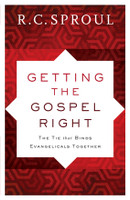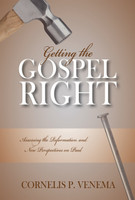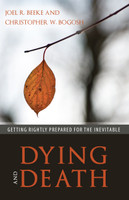
Getting the Garden Right (Barcellos)
- Affordable shipping (free $100+)
- 100,000+ customers served
- "Wonderful books, great prices, awesome customer service." – Ivan, IL
This is an important book. The Bible tells the story of God's salvation of sinners in Christ. But that story does not begin in Bethlehem. It begins, well, at the beginning, in the Garden. Adam's work and God's rest set the stage for the rest of history.
Contents:
- What is New Covenant Theology
- The Importance of Hermeneutics in Theological Formulation
Part 1: Adam’s Work in Light of Christ
- A Covenant of Works in the Garden: The New Covenant Theology Perspective
- A Covenant of Works in the Garden: The Confessional Formulation
- A Covenant of Works in the Garden: The Scriptural Arguments
Part 2: God’s Rest in Light of Christ
- The Doctrine of the Christian Sabbath: The New Covenant Theology Perspective
- The Doctrine of the Christian Sabbath: The Confessional Formulation
- The Doctrine of the Christian Sabbath: Adam’s Identity and Vocation
- The Doctrine of the Christian Sabbath: The Beginning and the End
- The Doctrine of the Christian Sabbath: Genesis 2:1–3
- The Doctrine of the Christian Sabbath: Exodus and the Prophets
- The Doctrine of the Christian Sabbath: New Testament Fulfillment
- The Doctrine of the Christian Sabbath: Hebrews 4:9–10
- The Doctrine of the Christian Sabbath: Revelation 1:10
Endorsements
“Nothing shapes how we interpret and apply the Bible as much as our understanding of covenant. Richard Barcellos offers us a helpful blend of biblical exegesis and theological reflection on the implications of covenant theology for God’s relationship with Adam and for the Lord’s Day. Though this book’s discussion is framed by debates among Baptist brethren, the issues are of great consequence to all who love our Lord Jesus Christ in sincerity. It serves as an effective antidote to New Covenant Theology, which, though saying many good things, can still do considerable damage to the church with regard to living out the Christian life practically and experientially. This is a welcome book written in an irenic spirit, and I pray that it will do much good in our day of great need to remain faithful to the biblically and carefully constructed covenant theology of our Puritan forebears. I am grateful that Dr. Barcellos underscores with clarity the vital importance of getting right the scriptural teaching on the covenant of works and on the Lord’s Day.”
Dr. Joel R. Beeke, President and Professor of Systematic Theology and Homiletics at Puritan Reformed Theology Seminary, and a pastor of the Heritage Reformed Congregation in Grand Rapids, Michigan
“Richard Barcellos presents a compelling critique of New Covenant Theology. His work integrates biblical, historical, and systematic theology. His arguments are irenic but nevertheless potent as he demonstrates the important links between the covenant of works, the Sabbath, and eschatology. His research is deep, his exegetical spadework is thorough, and his arguments cogent. Anyone interested in uncovering the deficiencies in New Covenant Theology should definitely read this book.”
J. V. Fesko, Academic Dean and Professor of Systematic and Historical Theology at the Westminster Seminary in California
“This book will serve the reader well from several vantage points. It provides a clean window into present discussion concerning New Covenant Theology and Covenant Theology. This issue has deeply important implications for understanding aspects of coherence, continuity, and discontinuity over the whole biblical corpus. Barcellos speaks to friends, not to enemies, and makes a transparently honest attempt to present the New Covenant view according to its own best arguments. He then seeks to focus the discussion around places where he discerns missteps or inconsistencies in interpretation or theological development. Although there is agreement on a multitude of doctrines—very important Reformation doctrines—among the adherents of both parties in the discussion, Barcellos isolates the issues of the covenant in the garden of Eden and the theme of Sabbath rest, Christologically perceived, as keys to sorting out differences, with the hope that greater agreement can be attained. Barcellos provides a model of how to integrate tight contextual issues, broadly conceived hermeneutics, biblical theology, and systematic theology into a covenantal framework, an important issue for both groups participating in this discussion. I believe this is a great step forward in defining Covenant Theology vis a vis New Covenant Theology and will help establish a foundation for more focused and edifying interaction.”
Tom Nettles, Retired Professor of Historical Theology at The Southern Baptist Theological Seminary in Louisville, Kentucky





